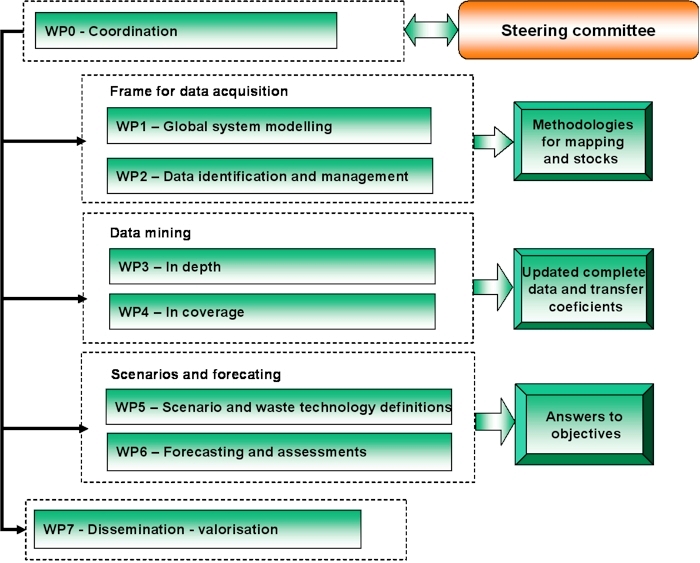|
|
 | Project organisation
|
|
The work programme is designed to favour the synergy between these objectives. All
WPs refer to one generic model for material flows, stocks and emissions, and include all materials/wastes considered, which makes the project coherent in the scientific approach and avoids overspecialisation on individual economic activities. It is composed of work packages of different nature:
|

|
One Framework work-package (WP0), |
|

|
Two “system modelling and data management” work-packages providing the model and data management guidelines for the other WPs
(WP1 and WP2), |
|

|
Two “data mining” work packages on the acquisition and validation of data for all materials/wastes under investigation
(WP3 and WP4). These WPs differ in the geographical approach:
WP3 goes in-depth in a few countries which have high quality statistics, while
WP4 is oriented towards complete coverage of the EU-27, with particular emphasis on East, Central and Southern Europe. |
|

|
Two “scenario and forecasting” work packages outlining the scenarios for future waste prevention, recycling and waste treatment, including environmental pressures. The calibration of the model with data from WP3 and WP4 provides the mapping of the present situation (time-zero point) in terms of material stocks, waste flows and environmental impacts, and the different scenarios are simulated on that basis
(WP5 and WP6), |
|

|
One horizontal work-package on dissemination and valorisation of results
(WP7). |
The framework work-package (co-ordination) addresses all other work packages along the entire project duration and is a crucial trigger to get all work packages in-line with the project objectives and deliverables. This workpackage also ensures the active involvement of the Steering Committee and makes sure that interested parties get structured “custom-made” information.
The system modelling, data identification and management work-packages will have the main purpose of guiding the efforts for data acquisition in a two steps procedure.
WP1 (system modelling) will provide a global modelling approach (environmentally extended, economic input-output based materials flow accounting framework) covering the entire material metabolism (flows of resources, emissions, products and wastes) of the economy at the relevant level of detail.
WP2 will identify key data and data sources for the overall system model and elaborate a strategy and guideline for data acquisition, calibration and documentation for
WP3 and WP4.
The data mining work-packages represent the raw new data resources of the project.
WP3 and WP4 will complete (and extend) the presently available data on material flows in each sector of the economy. They will be focussed on quantitative physical data on tonnage and composition of flows within the system. It is expected to have to deal with data of different nature: either economic (Euro) or physical (tonnage), through many possible sources including national statistics, professional branches, associations, direct interviews, etc.
WP3 will focus on a limited number of countries (Denmark, Austria, Germany and France) where data is considered as relatively complete and reliable and will cope with consistency problems. WP3 will produce the complete mass estimations of the material balance of each of the four countries, including transfer coefficients for each production and consumption process.
WP4 will on the contrary deal with the extension of the data coverage to the EU-27, addressing two specific issues:
 |
to obtain the most comprehensive generic data covering the EU-27 |
 |
to identify the specificities of the countries leading to different estimations in stocks quantity and quality (differences in products, buildings, infrastructure,…). |
It is expected to face important lacks in quantity and quality of data when addressing the complete map of Europe. One major outcome of this work package will be the elaboration of an “expression of needs” in resources and waste statistics. Nevertheless, whithout local data or means of adjustments, the process-based sectoral definition of the system will extended to all identical sectors of the EU-27 in terms of transfer coefficients for the mass balance and environmental pressures.
One of the main issues in the elaboration of these figures will be to determine the contribution of “materials leaks” pointed out in the balance to either re-usable stocks or dispersive losses.
The scenarios and forecasting work packages (WP5&WP6) will provide and apply three scenarios of the future waste treatment systems, embedded in three macro-economic scenarios (9 scenario in total).
WP5 will define the scenarios on the basis of previous scenario work, and will furthermore elaborate the technology scenarios for waste prevention, recycling and treatment, specifying also the corresponding environmental pressures.
WP6 will use the system model from
WP1&WP2, the data from
WP3&WP4
(representing the present situation), and the scenarios and waste treatment technologies from
WP5 to produce an estimation of stocks, wastes and environmental impacts for the different materials and waste types.
WP6 will provide direct decision support for the two project objectives. This work package will also evaluate the main uncertainties of the complete work: it will discriminate the sensitivity of the system to the quality of data, to the lacks in understanding the causes of non coherence in the material balance, and to the influence of the life-time of stocks.
The horizontal work-package (WP7) on dissemination, communication and valorisation guarantees the elaboration of a comprehensive and tailor-made information package. This final work package is completely dependant on the outcomes of the technical WPs and provides tailor-made results, presented to a wider public and ready to use.
Click on organigram for direct access to pages related to WP
or Steering Committee
|
|

|


